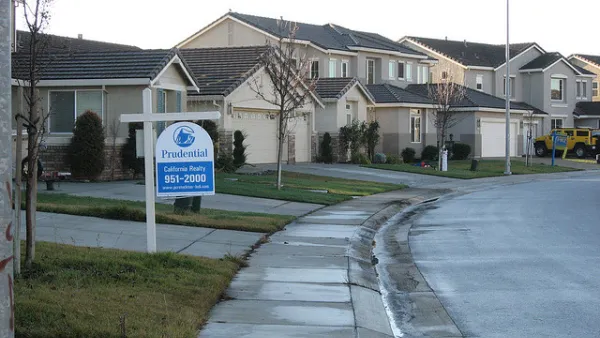More media attention for the growing influence of large, institutional investors on the housing market.

Heidi Groover examines one of the big questions of the contemporary housing affordability crisis: to what degree are investors responsible for run away housing costs.
Groover places the question in context of the housing market in Seattle, and with the help of data and analysis recently published by Redfin. Here is the key finding for the Seattle area, as explained by Groover:
The share of Seattle-area homes sold to investors has climbed steadily over the past two decades — from about 3% in 2000 to 9% this fall — according to data released by Redfin this week. Other measures vary, depending on how “investor” is defined. Those range from 6% to 29% of all home sales.
Groover also notes that the trends apparent in Seattle are also occurring around the country:
Nationally, investors bought a record-high 18% of the homes sold in the third quarter of this year, and investors increasingly turned to single-family homes, according to Redfin.
Despite the growing number of investors buying up homes, the verdict is more nuanced than blaming investors alone for skyrocketing housing prices:
Still, investors alone can’t explain Seattle’s increasingly out-of-reach housing market. Individual buyers with cash from stocks or the sale of their last home drive bidding wars, sometimes with all-cash offers.
In the feature-length source article linked below, Grover provides a lot more anecdotes, data, and insight into Redfin's recent study, as well as the real estate market around Seattle.
For more background, Planetizen has been tracking the emerging awareness of institutional investors in the housing market since 2019, including a deep dive into the subject in April 2021.
FULL STORY: So you can’t afford a house in Seattle. Are investors to blame?

National Parks Layoffs Will Cause Communities to Lose Billions
Thousands of essential park workers were laid off this week, just before the busy spring break season.

Retro-silient?: America’s First “Eco-burb,” The Woodlands Turns 50
A master-planned community north of Houston offers lessons on green infrastructure and resilient design, but falls short of its founder’s lofty affordability and walkability goals.

Delivering for America Plan Will Downgrade Mail Service in at Least 49.5 Percent of Zip Codes
Republican and Democrat lawmakers criticize the plan for its disproportionate negative impact on rural communities.

Test News Post 1
This is a summary

Test News Headline 46
Test for the image on the front page.

Balancing Bombs and Butterflies: How the National Guard Protects a Rare Species
The National Guard at Fort Indiantown Gap uses GIS technology and land management strategies to balance military training with conservation efforts, ensuring the survival of the rare eastern regal fritillary butterfly.
Urban Design for Planners 1: Software Tools
This six-course series explores essential urban design concepts using open source software and equips planners with the tools they need to participate fully in the urban design process.
Planning for Universal Design
Learn the tools for implementing Universal Design in planning regulations.
EMC Planning Group, Inc.
Planetizen
Planetizen
Mpact (formerly Rail~Volution)
Great Falls Development Authority, Inc.
HUDs Office of Policy Development and Research
NYU Wagner Graduate School of Public Service





























